By Devendra Yadav, head of food and beverage operations at Ingenious e-Brain Solutions
In response to growing concerns about the adverse effects of sugar-loaded beverage consumption on public health, companies are shifting their focus towards reducing the glycemic load in their products. Clinical trials have demonstrated that consuming sucrose or high-fructose corn syrup can amplify the risk factors associated with cardiometabolic disorders. Consequently, the global sugar market is experiencing a slowdown, fueled by heightened consumer health concerns and the implementation of sugar taxes in various countries, such as Europe, Mexico, and South Africa.
According to a Kerry research survey, 87% of consumers are actively attempting to minimize their sugar intake or use it more cautiously. As concerns about the detrimental effects of excessive sugar consumption on human health and the environment continue to escalate, the beverage industry urgently needs to explore sustainable alternatives to conventional sugar to attract potential customers.
Why has sugar reduction become the topic of discussion across the beverage sector?
The over-consumption of sugar has been linked to various health issues, including obesity, diabetes, and cardiovascular diseases. Moreover, sugar production contributes to environmental degradation through intensive farming practices and excessive water consumption. In response to growing concerns about the adverse effects of excessive sugar-added beverage consumption on public health, companies are shifting their focus towards reducing the glycemic load in their products. Addressing sugar reduction in beverages is a crucial step in promoting public health and mitigating environmental impacts. Sugar, despite lacking nutritional value, plays a significant role in our daily diets. The World Health Organization (WHO) recommends limiting sugar consumption to less than 10% of total caloric intake, with even greater benefits obtained if reduced to less than 5%.
Sugary drinks rank poorly among various beverages due to their high-calorie content and lack of nutritional value. For instance, a typical can of sugar-sweetened soda or fruit punch contains added sugars amounting to 150 calories, and consuming such beverages daily can lead to a weight gain of up to 5 pounds in a year. Additionally, these sugar-loaded drinks increase the risk of various health issues, including type 2 diabetes, heart disease, cavities, and chronic illnesses like arthritis. According to the International Diabetes Federation, 537 million people aged 20 to 79 had diabetes in 2021, with an increase to 643 million by 2030 and 783 million by 2045 expected.
Evolution and transformations in the sweetener industry
The first sugar-free beverage was introduced several years ago, notably in 1949, when La Casera was launched in Spain. This product, developed by Suntory Beverage and Europe Food, utilized cyclamate as an artificial sweetener. Prior to 1969, most diet beverages commonly used cyclamates and saccharin as sweeteners. However, subsequent laboratory trials conducted at the University of Wisconsin-Madison revealed that cyclamates were carcinogenic. As a result, extensive research was undertaken to find alternative sweeteners to replace sugar in beverages. Since then, the market for sugar-free beverages has continued to evolve and expand.
The industry has employed various strategies to reduce the sugar content in beverages. One approach involves the use of natural sweeteners like stevia or monk fruit, which have fewer calories and offer a more natural taste compared to artificial sweeteners. Another strategy focuses on reducing the overall sugar content of beverages while maintaining their flavor profiles by incorporating other ingredients such as spices or fruit extracts. These approaches enable the development of healthier beverage options that align with consumer preferences for reduced sugar intake.
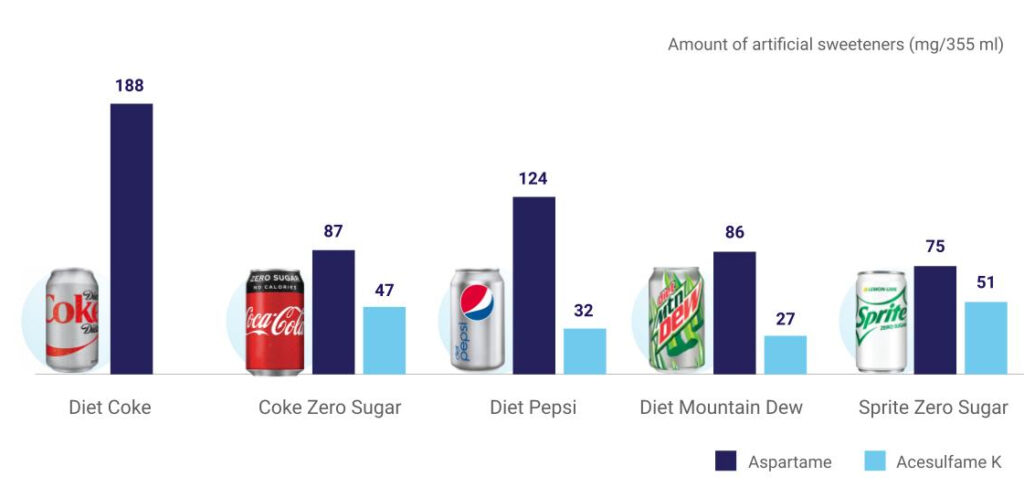
Understanding the available alternatives to reduce sugar content in beverages
Several ingredients are used to control the amount of sugar in beverages. These ingredients not only intend to add sweetness but also enhance the flavors of soft drinks. Beverage companies have been exploring different types of ingredients, including rare sugars, sugar alcohol, natural zero-calorie sweeteners, and artificial sweeteners, among others.
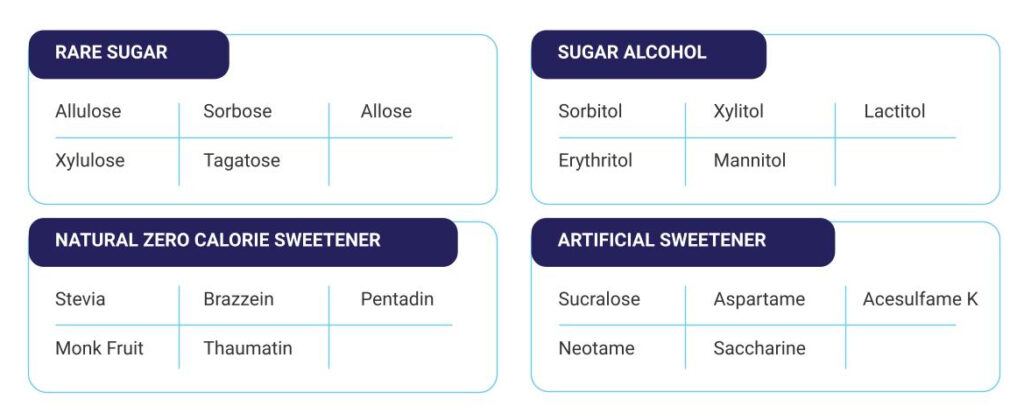
Trending technologies and strategies for sugar reduction in beverages
Considering the burgeoning negative health consequences, sugar reduction in beverages has become imperative, and the F&B sector must focus on limiting excessive sugar consumption. For this reason, multiple sugar reduction technologies and products are being introduced in the market.
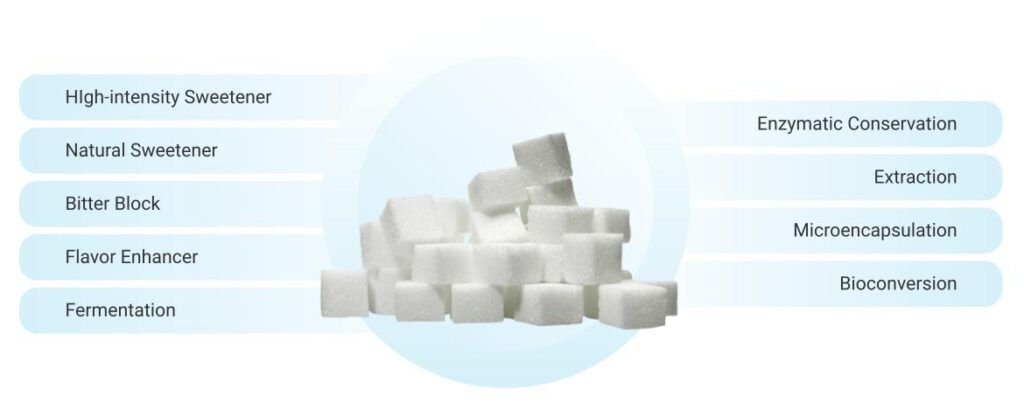
Key players throughout the sugar reduction/replacement sector’s value chain
Ingredient suppliers, OEM/packaging solution providers, and product manufacturers typically govern the sugar reduction/replacement sector. Some of the industry leaders in this sector are indicated in the figure below.
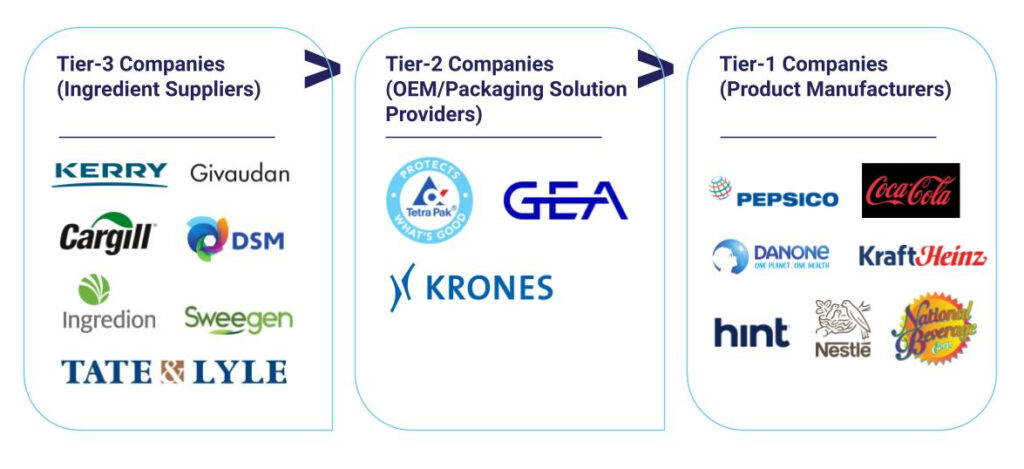
Key stakeholders/actors revolutionizing the sugar replacement industry
Ingredient Suppliers:
PureCircle (Acquired by Ingredion): A leading producer of stevia-based sweeteners, PureCircle offers natural, zero-calorie sweeteners derived from the stevia plant. Their products have gained popularity as an alternative to sugar in the beverage industry.
Tate & Lyle: Known for its expertise in food and beverage ingredients, Tate & Lyle offers a range of sweeteners, including low-calorie options like Splenda Sucralose. These sweeteners are widely used in sugar-reduced beverages.
OEM Providers:
Tetra Pak: A prominent provider of packaging solutions, Tetra Pak offers sustainable and convenient packaging made of paperboard, aluminum foil, and polyethylene for sugar-reduced beverages, ensuring product quality and longevity.
Krones AG: Specializing in beverage filling and packaging technology, Krones AG provides equipment and solutions that enable the efficient production and distribution of sugar-reduced beverages.
Product Manufacturers:
Hint Water: Hint Water offers a range of naturally flavored, unsweetened water products, appealing to health-conscious consumers seeking refreshing alternatives to sugary beverages.
National Beverage Corp.: Known for its sparkling water products, LaCroix offers a variety of sugar-free, naturally flavored options, providing consumers with a healthier choice in the carbonated beverage category.
R&D solutions and key inventions around the sugar reduction domain
Post-pandemic, most people have prioritized their health by cutting carbs. Therefore, researchers and innovators have been diligently exploring solutions to tackle the challenges of excessive sugar consumption, leading to remarkable innovations in the field.
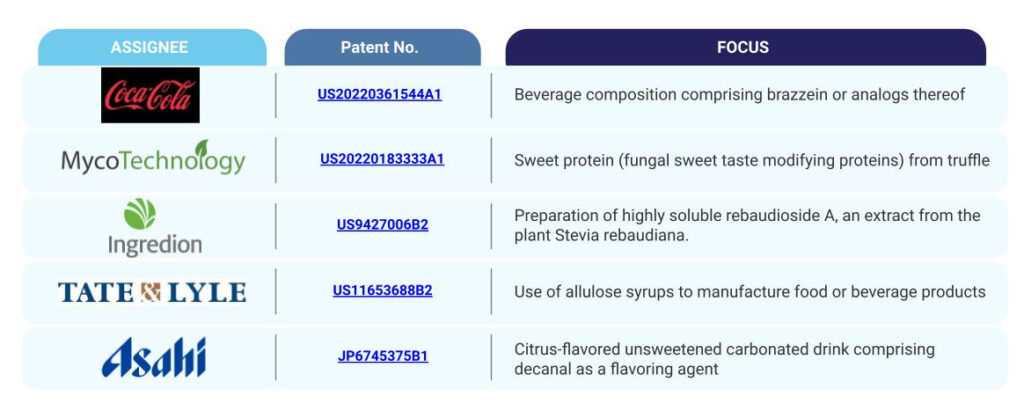
Impactful partnerships and acquisitions driving the sugar-free beverage industry
To meet the changing preference and tastes of consumers towards sugar-free beverages and revolutionize the segment of the beverage industry, major industry players have embarked on several strategic initiatives.
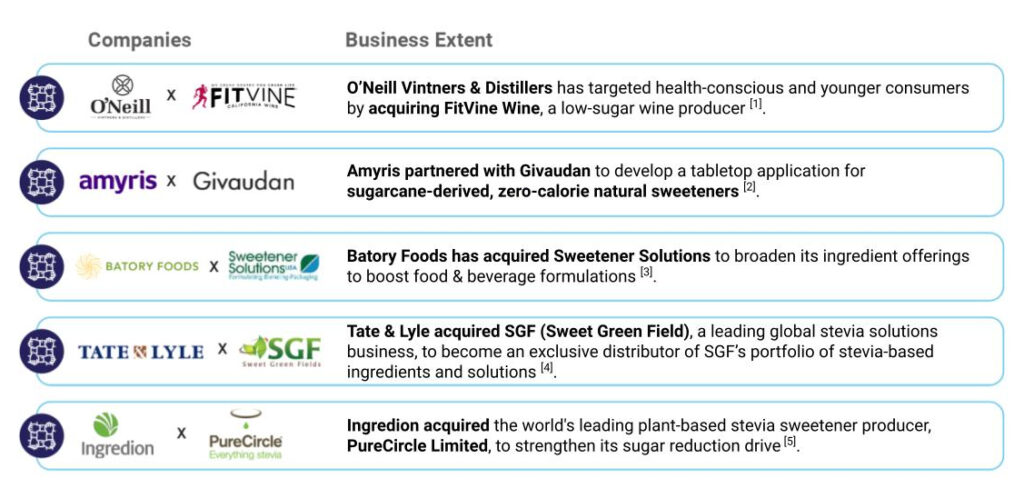
Catalysts and bottlenecks influencing the market growth
As health awareness grows and environmental concerns gain prominence, the beverage sector is undergoing a paradigm shift towards more sustainable and healthier options. Reduced sugar content in beverages has emerged as a critical target for organizations attempting to meet increasing customer needs in this setting.
However, the path to sugar reduction has its challenges. While various reasons propel the industry, it also faces impediments to advancement.
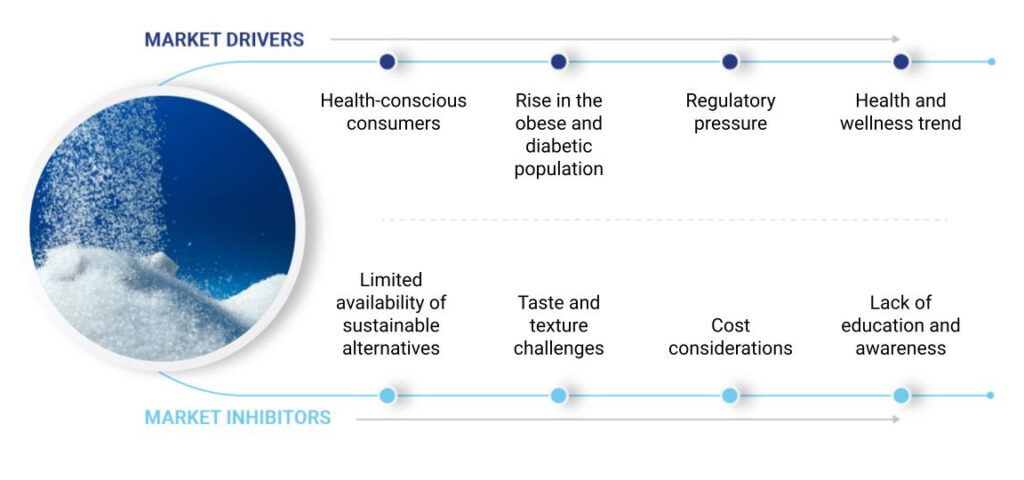
Conclusion and future outlook
Sugar-free beverages have enormous possibilities for future innovation, collaboration, and sustainability. As customer preferences shift towards healthier options, the beverage industry will continue to focus on lowering sugar content and investigating sustainable alternatives. Technological advancements in taste masking and the creation of natural, low-calorie sweeteners will contribute to better sensory experiences in sugar-free beverages.
Major industry players are participating in joint ventures, acquisitions, and mergers to nurture an innovative product portfolio to match consumer needs. These initiatives seek to create beverages that meet customer expectations while lowering sugar content. Brands prioritize product reformulation as they attempt to develop healthier options and respond to their customers’ desires.
With the convergence of consumer demands, regulatory initiatives, and technological advancements, the future for sustainable replacements for sugar in beverages is promising. By seizing these opportunities, the industry can help promote healthier lifestyles and a more sustainable future while providing a varied range of delectable and enjoyable beverage options.
 Devendra Yadav is heading Food & Beverage (F&B) operations at Ingenious e-Brain Solutions, a leading advisory and management consulting firm. Devendra supports multiple stakeholders across the F&B value chain through a wide range of services spanning across early innovation/research activity tracking, technology/partner/supplier scouting, competitive intelligence, customer analysis, go-to-market strategy, etc.
Devendra Yadav is heading Food & Beverage (F&B) operations at Ingenious e-Brain Solutions, a leading advisory and management consulting firm. Devendra supports multiple stakeholders across the F&B value chain through a wide range of services spanning across early innovation/research activity tracking, technology/partner/supplier scouting, competitive intelligence, customer analysis, go-to-market strategy, etc.
 Pages you might like
Pages you might like








 Latest information
Latest information
 Follow official account
Follow official account
 Online support
Online support
 鄂ICP备2022017323号
鄂ICP备2022017323号
 鄂公网安备 42018502006493
鄂公网安备 42018502006493
 Launch Exhibition
Launch Exhibition
 Release information
Release information



 Today's topic
Today's topic

















